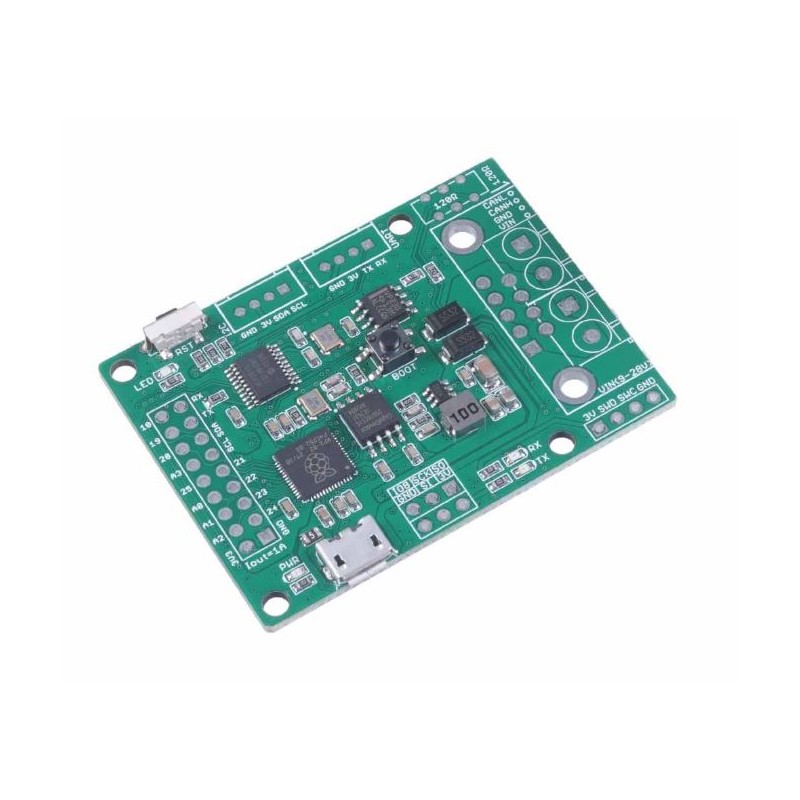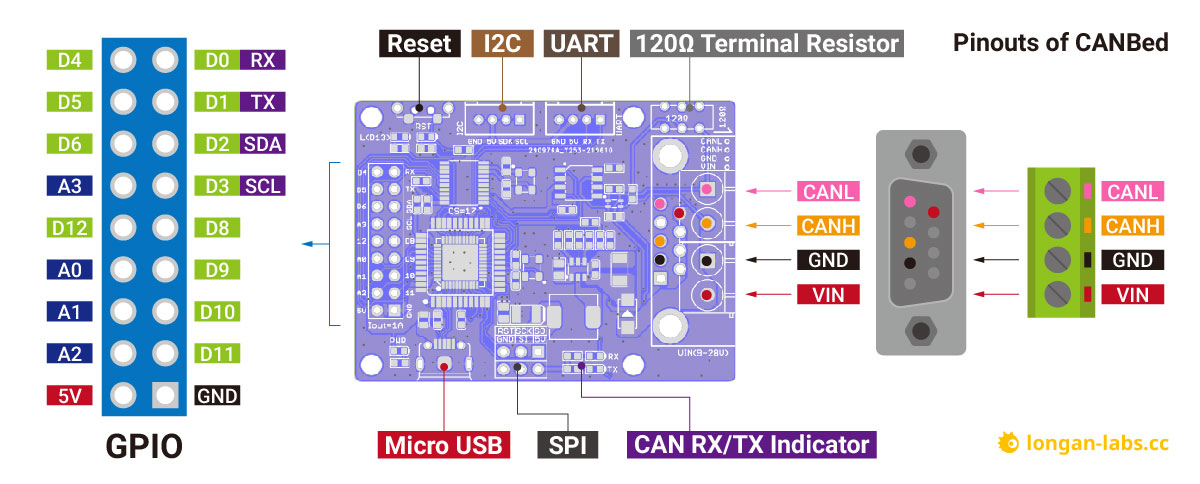

CAN module based on MCP2551 and MCP2515 systems. It uses a Raspberry Pi RP2040 microcontroller equipped with two ARM Cortex-M0 + cores operating at 133 MHz, 264 KB RAM and 2 MB QSPI flash memory.
The MCP2551 chip is a high-speed, fault-tolerant CAN transceiver that serves as an interface between the CAN protocol controller and the physical bus. Provides differential transmission and reception for CAN protocol controller and is fully compatible with ISO-11898 standard. The MCP2515 is a second generation standalone CAN controller. Offers high bandwidth, data byte filtering, and support for time-triggered protocols. The CAN bus communication speed can reach up to 1 Mb / s. The board has a D-sub connector and a screw connector with led out CAN lines. The user also has the I2C, UART, SPI interfaces, 3 analog inputs and 8 digital IOs at his disposal.

Data sheet
Manufacturer BTC Korporacja sp. z o. o. Lwowska 5 05-120 Legionowo Poland sprzedaz@kamami.pl 22 767 36 20
Responsible person BTC Korporacja sp. z o. o. Lwowska 5 05-120 Legionowo Poland sprzedaz@kamami.pl 22 767 36 20
Cable with USB typ A and microUSB typ B connectors, cable length 1 m. LANBERG CCP-MUSB2-AMBM-W-1M
Cable with USB typ A and microUSB typ B connectors, cable length 1.8 m. LANBERG CA-USBM-10CC-0018-BK
CAN module based on MCP2551 and MCP2515 systems with an OBD-II compatible connector. It uses the I2C or UART bus (Grove connectors) for communication. Seeed Studio 103030215
Expansion module with a Raspberry Pi Pico W board equipped with WiFi communication. The module has a built-in relay, buffer inputs, sink outputs and analog inputs. Perfect for controlling fans, pumps, solenoid valves, large motors, electronic locks or LED lighting. Pimoroni PIM652
No product available!
Module with a 1.14" IPS LCD display with a resolution of 240x135 px and a monochrome HM01B0 camera. Equipped with an RP2040 microcontroller. Waveshare PICO-Cam-A
No product available!
Module with a round 1.28" IPS LCD touch display with a resolution of 240x240 px and an RP2040 microcontroller. Equipped with an accelerometer and gyroscope. Enclosed in a nice metal housing. Waveshare RP2040-Touch-LCD-1.28-B
Module with a round 1.28" IPS LCD display with a resolution of 240x240 px and an RP2040 microcontroller. Equipped with an accelerometer and gyroscope. Enclosed in a nice metal housing. Waveshare RP2040-LCD-1.28-B
The RP2040 MCU board combines the high performance of two ARM Cortex M0+ cores clocked at up to 133 MHz, with 264 KB of SRAM, 2 MB of Flash, and integrated Bluetooth 5.1 for easy wireless communication. With simple programming, multiple GPIO interfaces, and support for C/C++, MicroPython, and Arduino, the board is ideal for IoT projects and other advanced applications. It comes with a USB Type-C adapter. Waveshare RP2040-BLE-Kit
The RP2040 MCU board combines the high performance of two ARM Cortex M0+ cores clocked at up to 133 MHz, with 264 KB of SRAM, 2 MB of Flash, and integrated Bluetooth 5.1 for easy wireless communication. With simple programming, multiple GPIO interfaces, and support for C/C++, MicroPython, and Arduino, the board is ideal for IoT projects and other advanced applications. Waveshare RP2040-BLE
Module with a round 0.99" IPS LCD display with a resolution of 128x115 px and an RP2040 microcontroller. Equipped with an accelerometer and gyroscope. Enclosed in a nice metal housing. Waveshare RP2040-LCD-0.99-B
Camera adapter based on Raspberry RP2040, dedicated to TinyML development. is equipped with a 2.4-inch LCD screen, microphone, camera connectors and an IMU module. It allows you to take photos, use WiFi, SD card and USB mass storage. ArduCam B0432
Raspberry Pi Pico 2, based on the RP2350 microcontroller, using the application and functional applications of the Cortex M33 and RISC-V cores, doubled SRAM memory and advanced security function, including Arm TrustZone. It is hardware and software with a connected model, which provides an attractive operation for enthusiasts and specialists in systems used
Raspberry Pi Pico 2W, based on the RP2350 microcontroller and has a built-in WiFi and Bluetooth communication module. Pi Pico 2W offers significantly increased performance and functionality thanks to the use of Cortex M33 and RISC-V cores, doubled SRAM memory and advanced security features, including Arm TrustZone. It is hardware and software compatible with previous models, making it an attractive choice for enthusiasts and professionals in the field of embedded systems
An enhanced version of the Raspberry Pi Pico 2 with access to all 48 GPIO pins and an RP2350B microcontroller (Cortex-M33 or RISC-V) clocked at up to 150 MHz. It offers 16 MB of Flash, 8 MB of RAM, and a microSD card reader, making it ideal for complex embedded and IoT projects. With USB-C, Qwiic/Stemma Qt, UEXT connectors, and BOOT/RESET buttons, it offers high flexibility and easy integration with peripherals. Olimex RP2350-PICO2-XXL
Raspberry Pi Pico 2 H, based on the RP2350 microcontroller, using the application and functional applications of the Cortex M33 and RISC-V cores, doubled SRAM memory and advanced security function, including Arm TrustZone. It is hardware and software with a connected model, which provides an attractive operation for enthusiasts and specialists in systems used. Version with joints.
Raspberry Pi Pico 2WH, based on the RP2350 microcontroller and has a built-in WiFi and Bluetooth communication module. Pi Pico 2WH offers significantly increased performance and functionality thanks to the use of Cortex M33 and RISC-V cores, doubled SRAM memory and advanced security features, including Arm TrustZone. It is hardware and software compatible with previous models, making it an attractive choice for enthusiasts and professionals in the field of embedded systems. Version with soldered joints.
A powerful development board based on the Raspberry Pi RP2350 chip with a dual-core Cortex M33 150 MHz processor and 528 KB RAM, offering 37 GPIO pins and 16 MB of QSPI Flash memory. It supports power supply via USB-C or DC, has a DVI connector, microSD slot, Pico Probe debug port and programmable UF2 bootloader. Thanks to the wide support of programming languages (C/C++, MicroPython, CircuitPython, Arduino), it will be suitable for both educational projects and advanced embedded solutions. Adafruit 6003
Compact development board based on the Raspberry Pi RP2350 microcontroller, equipped with two cores (ARM Cortex-M33 and Hazard3 RISC-V), 520KB RAM and 2MB Flash, ideal for IoT, smart home and wearable projects. With 11 IO pins, battery charging support, C/C++/MicroPython/Arduino programming and SMT support, it is perfect for rapid prototyping and mass production. DFRobot DFR1188
This RP2040-based evaluation board features an embedded W5500 Ethernet controller, providing hardware-based TCP/IP support without burdening the microcontroller. Its compact design, PoE support, and Raspberry Pi Pico-compatible interfaces make it ideal for IoT, automation, and networking projects. WIZnet W5500-EVB-Pico-POE
No product available!

CAN 2.0 module based on the MCP2551 and MCP2515 systems, equipped with the RP2040 microcontroller. Seeed Studio 102991596
